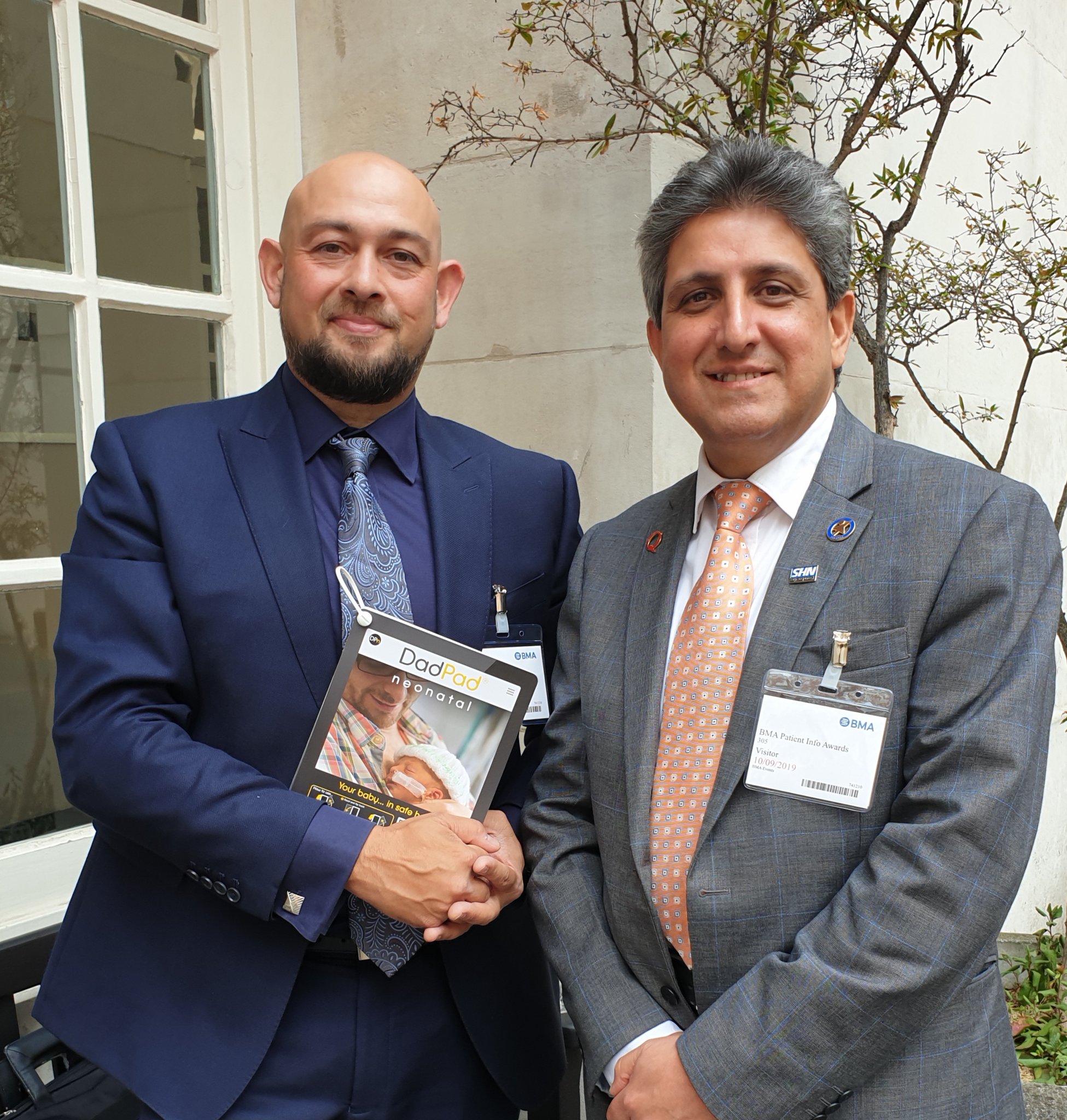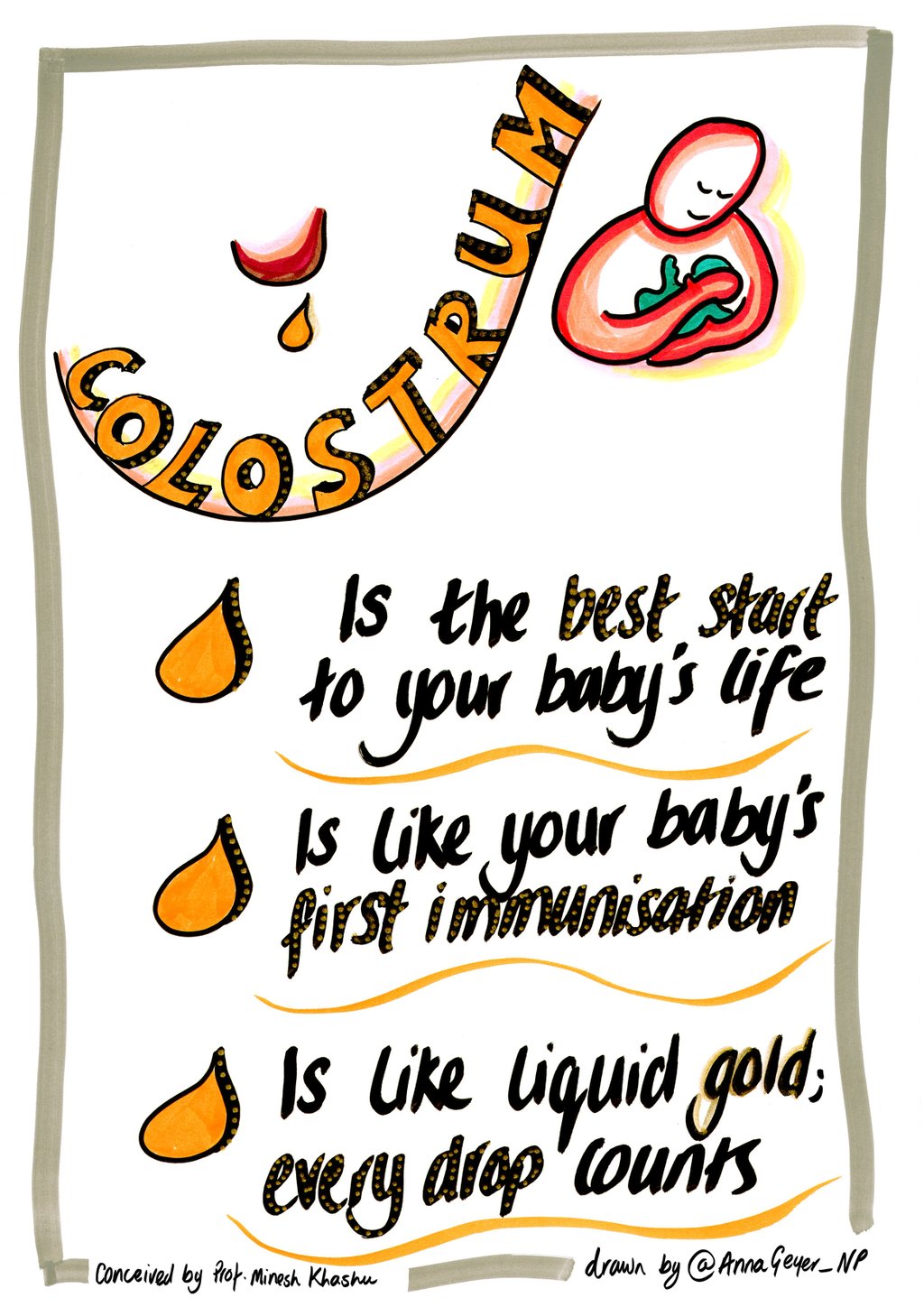
Colostrum and Breastfeeding
By Hannah Bose | 1st August, 2020 | 4 minutes read
Today, Saturday 1st August, is the first day of World Breastfeeding Week 2020. Started in 1992, World Breastfeeding Week is a global campaign which aims to inform and engage, as well as to generate improved public awareness of and support for breastfeeding.
Our aim, throughout August, is to provide information to help dads learn more about breastfeeding, in order for them to be better able to provide support to their partner as she breastfeeds their baby. We’re hoping to get four blog posts out to you across the month, starting today with this piece, written with our good friend, Professor Minesh Khashu, Consultant Neonatologist at Poole Hospital, Dorset.

DadPad’s Julian and Prof Minesh Khashu at the BMA Patient Information Awards in London in October 2019, where our co-produced DadPad Neonatal was ‘Highly Commended’ in the Innovation category.
Hi Minesh. Thank you for taking the time to talk with us. We thought we’d start our blogs all about breastfeeding with a focus on colostrum.
Could you please start by explaining what colostrum actually is?
Colostrum is the initial ‘milk’ produced by the breasts for the first few days after birth. Colostrum can be produced by the mammary glands quite early in pregnancy (from around 16-22 weeks), although most women will not become aware of it until around the time of birth. It is produced for 2-4 days after birth, when it transitions into the more usual milk.
How does colostrum differ from the usual milk that mum will produce?
Colostrum is different from later milk in terms of its amount (much smaller volumes), appearance (yellower, and hence the term ‘liquid gold’) and what it contains. Whilst it has nutrition in a concentrated form, it more importantly has many infection-fighting compounds in much higher concentration, as well as factors that promote the development of the gut of your child and its good bacteria and, hence, long-term health.
The fluid your breasts produce in the first few days after birth is called colostrum. It’s thick and usually a golden yellow colour. It’s a very concentrated food, so your baby will only need a small amount, about a teaspoonful, at each feed.
Definition of colostrum from NHS website
So is this why colostrum is considered so important for newborn babies to receive?
Yes. Even though it is only produced in small quantities, it plays a very important role in the development of immunity (that is, the body’s ability to fight infections) – colostrum is actually like your baby’s first immunisation! It provides your baby with lots of protective factors, which will help them to fight infections. It also helps good bacteria to colonise your baby’s intestines and develop the ‘gut biome’. This generates better gut health for baby, and can also positively impact on baby’s long-term health and wellbeing.
You are a Neonatologist, working with sick and premature babies, many of whom have to be fed via a tube in the early days.
Are sick and premature babies still able to receive colostrum from their mum?
Colostrum is even more important for such babies, as it helps to build their immunity and keep infections at bay, as well as helping their intestines and gut develop.
We offer mothers special ‘colostrum packs’ to support the collection of the colostrum, which we can then feed to their babies via the feeding tube.
What advice would you give to parents-to-be who aren’t sure that they want to breastfeed?
Talk to the healthcare professionals looking after you and your baby. They will be able to inform you about the huge benefits of colostrum and breast milk for baby.
However, any amount of breast milk is better than nothing, in terms of the long-term health of your child, as well as mum’s own health and wellbeing. You should definitely give colostrum to your baby – it’s the best start to life that they can get.
This is not just food for your baby – it has an impact on your child’s long-term health.
Thank you for your time.
If you’d like to find out more about colostrum, have a look at the NHS “Breastfeeding: the first few days” webpage and on the La Leche League International’s Colostrum page.
Further reading and references
If you’d like to find out more about colostrum, have a look at the NHS “Breastfeeding: the first few days” webpage and on the La Leche League International’s Colostrum page.


